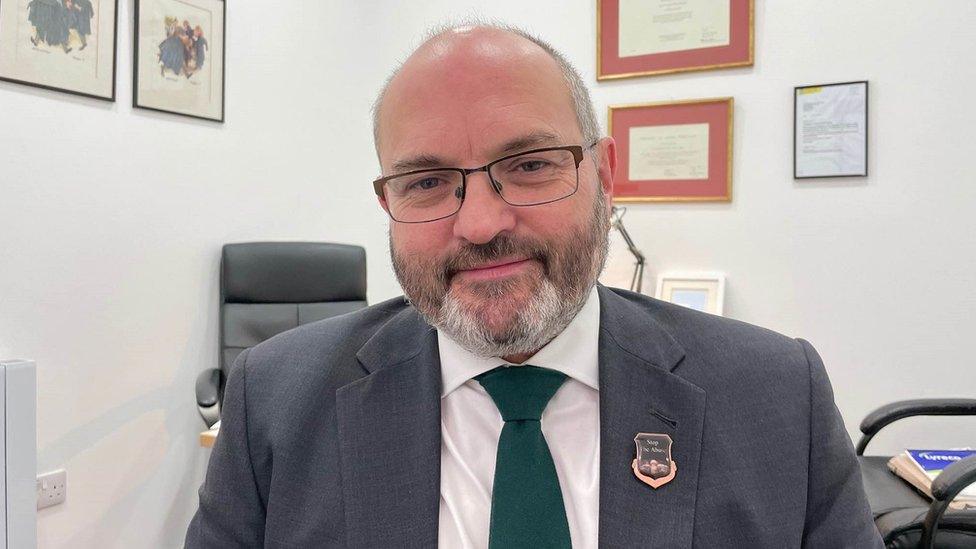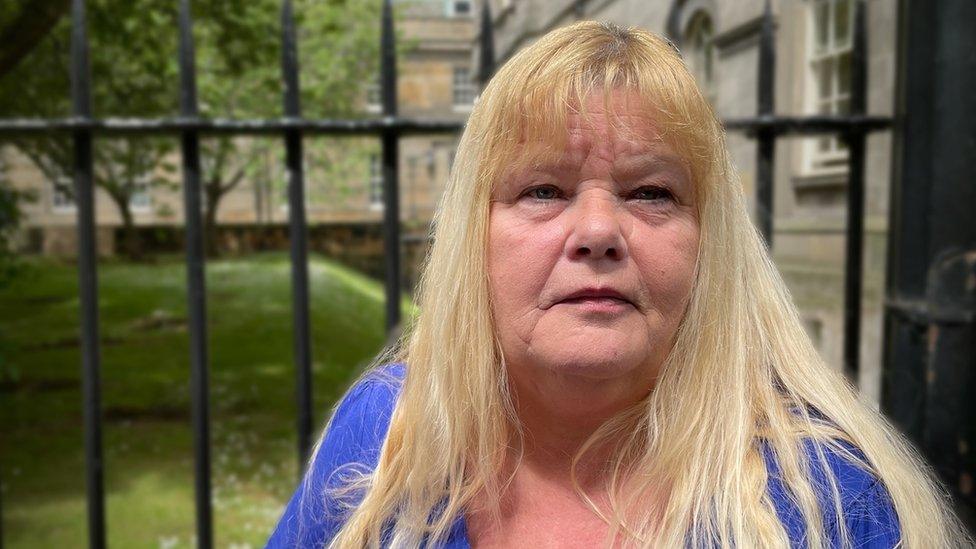Child abuse survivors lose faith in redress payment scheme
- Published

The Scottish government says more than £8m has already been paid to survivors of historical abuse in care
Some child abuse survivors say they have lost faith in the Scottish government's redress scheme.
They say it has been plagued by delays, failures and broken promises.
The compensation scheme was set up last December to provide one-off payments for people abused as children in care.
The Scottish government says more than £8m has already been paid to survivors of historical abuse and more case workers have been recruited to improve the delivery of the scheme.
Rosie (not her real name) is a working mum who was sexually and emotionally abused by foster carers in East Lothian.
She applied for the Redress Scheme but she thought there would be more support for applicants.
"I thought it was quite difficult," she said. "I read a small amount in my records and it took me three months to heal from what I'd read."
Rosie employed a lawyer because the bureaucracy was too difficult for her to deal with emotionally.
She said the scheme should be quick and compassionate but she found it a "long and difficult" process.
She added: "It's not acceptable for survivors to have to keep reliving their trauma because a public body can't get their skates on and fix things."

INCAS Solicitor Simon Collins said he's seen an increased number of survivor compensation payments
Scotland's Redress Scheme was set up to recognise and acknowledge survivors of historical abuse in care.
It compensates people abused before 1 December 2004 who were under the age of 18 at the time.
As of 30 October, 277 applications have been passed to Redress Scotland for consideration and of those 178 have had a payment.
In total £8.57m has been paid to abuse survivors.
Simon Collins is solicitor for the In Care Abuse Survivors (INCAS) group.
He urged survivors not to turn their backs on the scheme.
He said: "I'm aware there are delays that have been entirely unacceptable over the period, some survivors have waited 10, 11 months."
But Mr Collins said he has recently begun to see an increased number of payments.
He added: "That's very positive because you get the acknowledgement to the survivors, the payment of the redress which, because of the involvement of the government scheme, goes 100 per cent to the survivors, there's no deduction from the fees.
"That positive outcome should be borne in mind."

Digby Brown partner Kim Leslie has represented some applicants for the scheme
Kim Leslie is a partner at Digby Brown Solicitors who have also represented some applicants for the scheme.
She said people are getting put off by delays, a lack of communication and an overly complicated process.
"A survivor has a short window of tolerance for let down," she added. "There is a big difference between what was promised and what is being delivered.
"So my advice would be to get round the table now and try and implement immediate improvements to make this meet the needs of survivors."
Deputy First Minister John Swinney said the Scottish government had increased staff numbers working on Redress Scotland due to the "very high number of applications".
He said: "We're taking care to work our way through those applications in an empathetic manner, to support individuals and get them the answers that they deserve.
"This will be painful process for survivors because it requires them to revisit, to some extent, the horrors of the abuse that they have suffered."
'Less adversarial'
The scheme was launched after the Redress for Survivors (Historical Child Abuse in Care) (Scotland) Act 2021 received Royal Assent in April last year.
The Scottish Child Abuse Inquiry, set up in 2015, is currently examining the abuse of children in care in Scotland.
A restriction order issued by the chair of the inquiry prevents applicants from using their inquiry statement as part of their application - it operates independently of the government.
A Scottish government spokesperson said: "Scotland's Redress Scheme is designed to be swifter and less adversarial than civil court action, and the number of applications received to date is in line with projections.
"More than £8 million has already been paid out to survivors in less than one year of the scheme being in operation, with 8% of applicants having requested a review out of 189 payment offers.
"As each application is unique to an individual's experience it is not possible to determine an average timescale however priority is given to applicants with a terminal illness and those over 68 years of age."
The Scottish government said that following feedback from survivors the operating model for the Redress Scheme has been improved and that additional case workers have been recruited.
It said practical and emotional support was available to applicants at each stage of the process.
- Published3 May 2022

- Published15 June 2022

- Published8 December 2021
